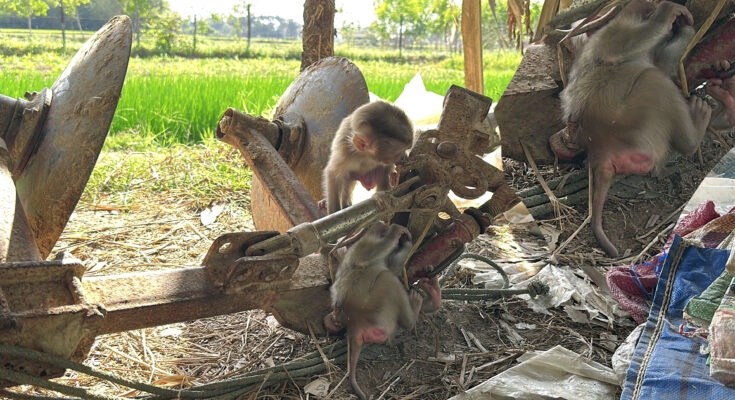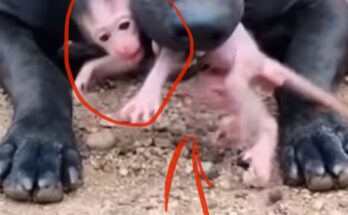In the lush jungles and dense forests around the world, a young baby monkey’s survival is largely dependent on the care it receives from its mother. However, not all little ones are so fortunate. Some face heart-wrenching challenges, starting from the moment they are born. Imagine a poor little baby monkey, with wide eyes and an innocent face, but no milk to nourish its fragile body. Without the essential nutrients it needs, the prospects of survival grow increasingly grim.
The Importance of Milk for Baby Monkeys
For mammals like monkeys, milk is crucial for the early stages of life. It provides them with the nutrition, hydration, and antibodies they need to develop a strong immune system and grow healthily. For baby monkeys, the first few months of life are particularly sensitive. In the wild, mothers typically nurse their young for several months, allowing them to build strength, develop social skills, and learn the ways of their environment.
When a baby monkey lacks access to its mother’s milk, whether because of abandonment, injury, or death, it faces immediate risks. Dehydration is one of the first challenges, as milk not only provides sustenance but also helps to maintain fluid levels. Without the steady supply of milk, the baby monkey’s health quickly declines, and its body becomes vulnerable to illness and malnutrition.
The Tragic Reality: A Baby Monkey Without Milk
The story of a poor little baby monkey without milk is a tragic one. In many cases, baby monkeys face difficult circumstances that are beyond their control. Some may lose their mothers due to human encroachment into their habitats, deforestation, or even poaching. Others may be orphaned because of natural predators or disease outbreaks that strike their families. Without the protection and nourishment of their mother, these young monkeys are left in an unforgiving world, struggling for survival.
For orphaned monkeys, survival often depends on human intervention. Wildlife rescue centers play an essential role in saving these vulnerable creatures, offering hope where there might otherwise be none. When a baby monkey is found without its mother, trained caretakers step in to provide care. They may feed the young monkey a specialized formula, mimicking the nutrients of the mother’s milk, and provide a safe, nurturing environment to foster recovery.
However, despite the best efforts of conservationists, some baby monkeys don’t make it. The absence of their natural mother, and the challenges of being raised in a human environment, can take a toll on their overall well-being. In addition, when orphaned monkeys grow up in captivity, they face the difficult task of adjusting to the wild once they’re old enough to be released. Without their mother’s teachings, they may struggle to learn essential survival skills like finding food or avoiding predators.
The Role of Conservation Efforts
While the plight of the poor little baby monkey without milk can feel like a sad and helpless situation, there is hope. Many organizations around the world are dedicated to preserving endangered monkey species and supporting orphaned or injured individuals. Through wildlife sanctuaries, rehabilitation programs, and efforts to combat deforestation and poaching, these organizations are working hard to ensure that the story of the orphaned monkey doesn’t end in tragedy.
Education is also an important part of these conservation efforts. By spreading awareness about the importance of protecting these creatures and their natural habitats, we can work together to ensure that fewer monkeys are orphaned, and more babies can grow up with the love and nourishment they need to thrive.
Conclusion
A poor little baby monkey without milk is a heart-wrenching image, one that highlights the fragile nature of life in the wild. While the challenges they face are immense, there is still hope. Through the support of rescue organizations and the collective efforts to preserve their natural habitats, these young creatures have a better chance at survival. It is our responsibility to ensure that we protect these vulnerable species so that future generations of baby monkeys can grow up healthy and strong, with a mother’s care and the chance to live freely in their natural world.



